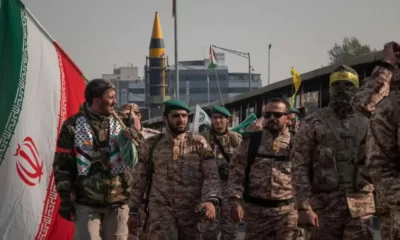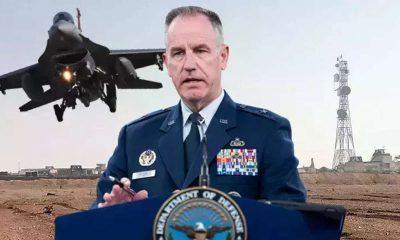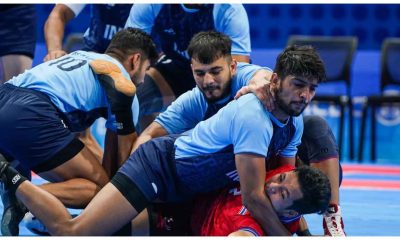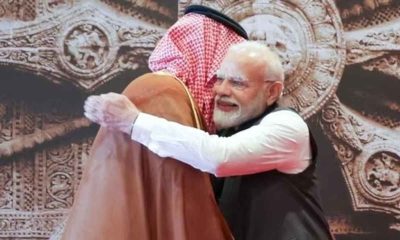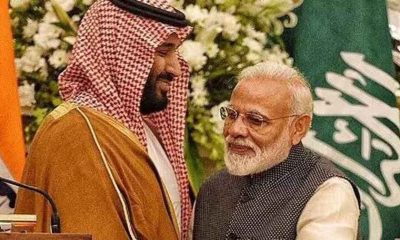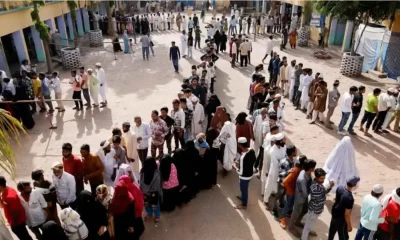Latest world news
Lebanon PM Hariri’s detention in Saudi Arabia seems confirmed
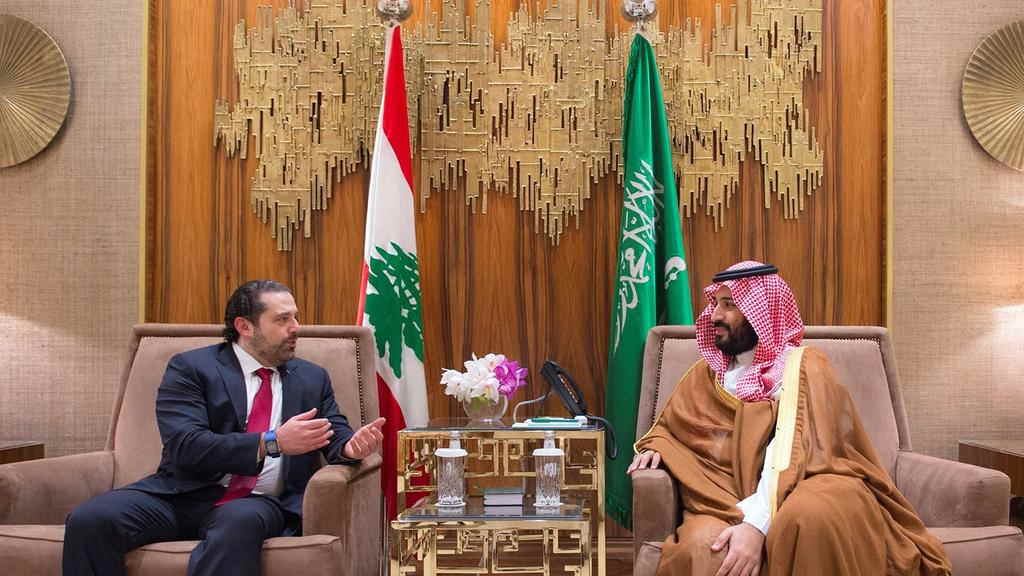
[vc_row][vc_column][vc_column_text]Hariri’s resignation from foreign land is shameful act for Lebanese people
It is now confirmed that Lebanese PM Saad Hariri is in illegal custody of Saudi Arabian authorities at an unknown location. It vindicates Lebanese President Micheal Aoun’s fear that Hariri was kidnapped in Saudi Arabia.
According to Reuters, from the moment Saad al-Hariri’s plane touched down at King Salman airport in Riyadh on Friday November 3, he was in for a surprise. He was not welcomed by Saudi princes or officials. Instead his phone was confiscated and the next day he was forced to resign as PM in a statement broadcast by state owned Al-Arabia TV. Hariri received a phone call on November 3 night from Riyadh for an unscheduled visit without accompanying aides or senior officials.
On November 7, Saad Hariri reportedly travelled from Riyadh to UAE to meet Crown Prince Sheikh Mohammed bin Zayed. But no follow up stories were reported about his meetings in Abu Dhabi.
On Friday, November 10, Lebanon’s president Michel Aoun told foreign ambassadors based in Beirut that Saad al-Hariri has been “kidnapped” by Saudi officials and must have immunity. He has been convening high-level meetings with Lebanese politicians and foreign diplomats since Hariri resigned in a surprise broadcast on November 4.
Reports quoting sources close to Hariri say that Saudi Arabia has concluded that the Saad Hariri had to go because he was unwilling to confront Hezbollah. Riyadh hopes to replace Saad Hariri with his older brother Bahaa, who is believed to be in Saudi Arabia. However, Hariri family members have refused to accept Riyadh’s invitation to travel to Saudi Arabia to pledge allegiance to Bahaa, sources have claimed.
One of these sources told Reuters, “When Hariri’s plane landed in Riyadh, he got the message immediately that something was wrong. There was no one waiting for him.”
Meanwhile Saudi Arabia has dismissed the allegation of “kidnapping” Hariri saying he is a free man. However no Saudi official came forward for a comment on the circumstances of Hariri’s arrival, whether his phone had been taken, or whether the kingdom was planning to replace him with his brother.
But his complete disappearance from public has generated suspicion. Hariri has not given any public remarks since he resigned over a week ago.
Hezbollah leader Hassan Nasrallah, who is considered to be influenced by Islamic revolution of Iran, said on Friday that Saudi Arabia had declared war on Lebanon and accused Riyadh of detaining Saad Hariri and forcing him to resign for politically destabilizing Lebanon. He said that Hariri’s resignation while travelling to Saudi Arabia was an insult to all Lebanese people. He demanded that he must return to Lebanon.
Nasrallah was first Lebanese leader to say, “Let us say things as they are: the man is detained in Saudi Arabia and forbidden until this moment from returning to Lebanon.”
France became the first Western country to indicate that Saudi Arabia was holding Hariri against his will, saying it wished for him to have “all his freedom of movement and be fully able to play the essential role that is his in Lebanon”.
French President Emmanuel Macron, before his unscheduled visit to Riyadh on November 12, had reportedly said that all Lebanese officials should live freely, “which means having a very demanding stance on those who could threaten any leader”.
According to observers, Saudi move to force Hariri to resign was aimed to weaken Hezbollah by creating political vacuum in Lebanon at a time when Daesh (IS) is defeated in Syria and Iraq with active Iranian support. Iran, Iraq and Syria have been alleging Saudi Arabia for its support to Daesh terrorists and consider it as an act of sharing responsibility of implementing the larger US-Israeli plan in the region.
The rivalry between Saudi Arabia and Iran was witnessed in Iraq, Syria and Yemen, where they support rival sides. Saudi has long tried to weaken the Iran-backed Hezbollah, one of the main political parties in the Lebanese ruling alliance.[/vc_column_text][/vc_column][/vc_row]
Latest world news
Bigg Boss 14 contestant Rahul Vaidya struggles walking in knee deep water, compares Dubai rains with Mumbai floods
Singer and TV personality Rahul Vaidya was recently stranded in the Dubai rains.

Rahul Vaidya, who was in Dubai ahead of his show which was scheduled to take place today, left the country due to heavy rains and reached Kolkata. The artist shared on social media his encounters in the UAE city, including challenges like walking through knee-deep water. Rahul provided an update regarding the heavy rainfall in Dubai on his Instagram profile.
The Bigg Boss 14 contestant revealed that he was in Kolkata and prepared to do an evening performance. Recalling the terrifying period he went through, Vaidya said there was a lot of confusion and panic in Dubai. The situation was similar to that when heavy floods hit Mumbai in 2005.
Vaiday also posted seval other images and videos of cars that were underwater and flooded roadways. The Bigg Boss 14 contestant, who shared his ordeal, claimed that even though it had just rained for two hours, the situation was dire.
In one of the video, which went viral he can be seen struggling in walking in knee-deep water. He can be also seen holding his sneakers in one hand and with other hand he was seen managing other things.
This is the result of the two hours of rain that it had, he can be heard saying in the video. Vidya also said he dosen’t believe Dubai is accustomed to a lot of rain. Everything had stopped working, he remarked.
After taking part in the first season of the singing reality show Indian Idol, Rahul Vaidya gained widespread recognition. In addition to Bigg Boss, he took part in Khatron Ke Khiladi 11.
Meanwhile, heavy rains that triggered flooding in the UAE and Bahrain, which left 18 people dead in Oman on Sunday and Monday, have paralyzed the financial hub of the Middle East, Dubai.
A lot of incoming flights were diverted from Dubai’s international airport because of the rain. At 7:26 p.m., the busiest airport in the world for foreign visitors stopped accepting new arrivals; a gradual resumption was announced for more than two hours later.
Images of planes navigating flooded tarmacs are making the rounds on social media.
According to pictures shared on social media, the flagship malls Dubai Mall and Mall of the Emirates both experienced heavy floods, while at least one Dubai Metro station had water up to the ankles.
There were several road collapses, severe flooding in residential areas, and numerous reports of leaks from windows, doors, and roofs.
Due to the unfavourable weather, schools around the United Arab Emirates were forced to close, and as more storms are predicted, the closures are anticipated to last until Wednesday. The government of Dubai allowed its staff to work remotely till this Wednesday.
Latest world news
Dubai sky turns green during storm in UAE, video goes viral
The UAE witnessed record-breaking rainfall on Tuesday and the National Centre of Meteorology recorded 254 mm of rainfall in less than 24 hrs in the Khatm Al Shakla area in Al Ain.

1 person was killed in UAE as it witnessed heavy rainfall on Tuesday, stranding commuters, flooding roads, disrupting trains and flights and resulting in water leakage from mall ceilings. The UAE witnessed record-breaking rainfall on Tuesday and the National Centre of Meteorology recorded 254 mm of rainfall in less than 24 hrs in the Khatm Al Shakla area in Al Ain. It is being said that the rainfall was the highest documented since the start of data collection in 1949.
The heavy rainfall in UAE came days after a similar situation in neighbouring Oman, where 13 people were killed in flash floods. Many parts of Oman saw torrential rains, which caused students to be trapped in buses and swept away motorists and trapped people in their homes.
Videos from Dubai circulating on social media showed widespread waterlogging on roads in Abu Dhabi, Dubai and other important cities. This left daily commuters in cars and other vehicles struggling to get back home. Dubai metro station too was seen flooded and closed.
One such video circulating on social media shows the aerial view of the city of Dubai from the top of a building. In the video the stormy winds are seen blowing over the city of Dubai. As the storm intensifies the Dubai sky turns green and ultimately gets covered by heavy rainfall. The video has gone viral on social media with more than 1.1 million views.
Another video showed water leakage from the ceilings of shopping malls, flooding the floors and destroying goods. A video which was shot in the famous Mall of the Emirates, showed pieces of ceiling falling as the rainwater gushed inside. Videos from many outlets of the Deira City Centre mall chain showed escalators being rendered unusable. Majid Al Futtaim, the company which owns the Mall of Emirates, said that the shopping complexes have been kept open and the customers are being sent away from the flooded areas.
India News
Sri Lankan Minister Douglas Devananda says statements on reclaiming Katchatheevu island from Sri Lanka have no ground
Devananda told the media on Thursday that it is not unusual to hear such claims and counterclaims about Katchatheevu as elections are taking place in India.
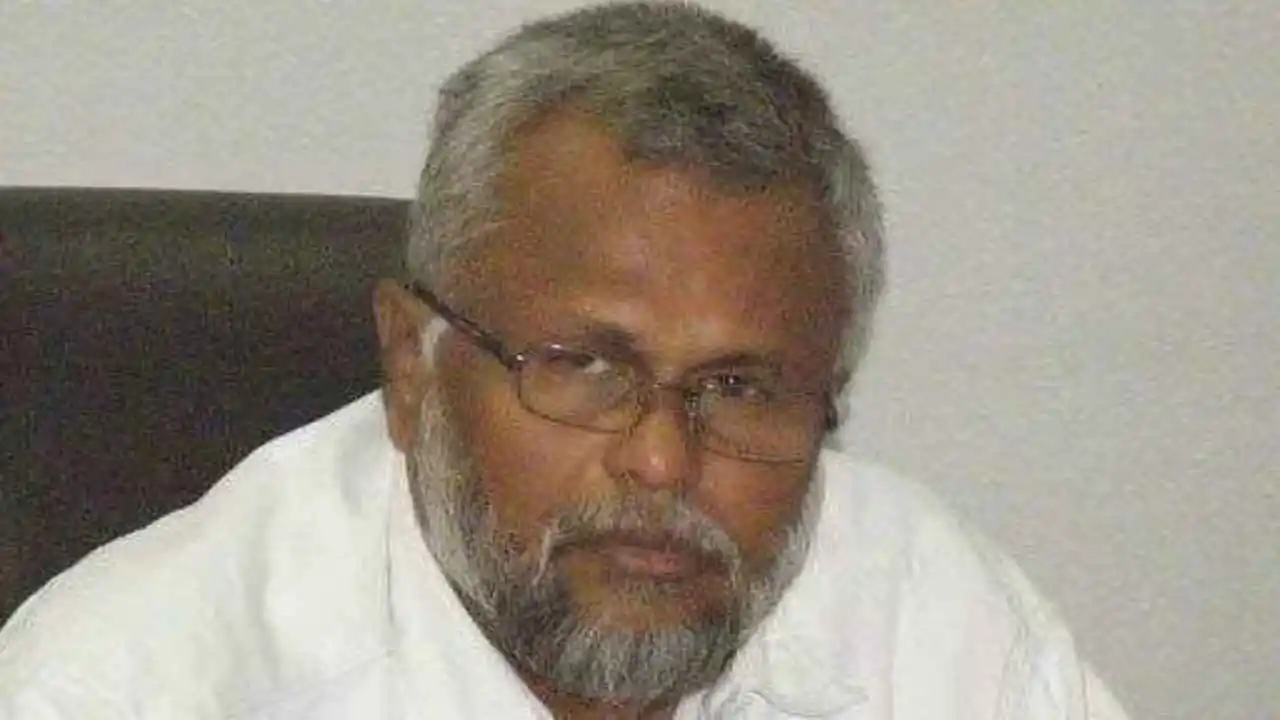
Sri Lankan Minister Douglas Devananda has said the statements from some political leaders in India on reclaiming Katchatheevu from the island nation have no ground. He told the media on Thursday that it is not unusual to hear such claims and counterclaims about the strategic island as elections are taking place in India.
The Sri Lankan Minister said he thought India is acting on its interests to secure this place to ensure Sri Lankan fishermen would not have any access to that area and that Sri Lanka should not claim any rights in that resourceful area. According to the 1974 agreement, Devananda said Indian and Sri Lankan fishermen can go fishing in the territorial waters of both countries until the pact was reviewed and amended in 1976.
The amended agreement resulted in fishermen from both countries being barred from fishing in neighboring waters. India’s ministry of External Affairs (MEA) on Thursday steered clear of the row surrounding Katchatheevu island. To a volley of questions on the Katchatheevu issue, MEA spokesperson Randhir Jaiswal reffered to External affairs Minister S Jaishankar’s recent comments on the matter.
He said he would like to talk about the issue that has been raised. He added the External Affairs minister has spoken to the press here in Delhi and also in Gujarat and has clarified all the issues. He said everyone should look into the press engagements and they would find the answers to their questions there.
The remarks from Devananda, a Sri Lankan Tamil, came days after the Narendra Modi government accused the Congress and its ally DMK in Tamil Nadu of overlooking national interests by handing over Katchatheevu island to Sri Lanka in 1974. The BJP has also been slamming the 2 parties for not ensuring the rights of the fishermen wanting to fish in waters around the island.
-
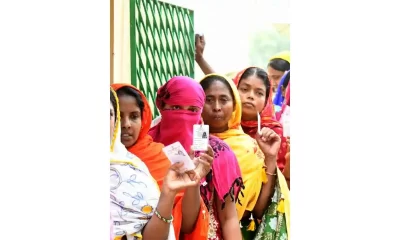
 2024 Lok Sabha Elections19 hours ago
2024 Lok Sabha Elections19 hours agoPrime Minister Narendra Modi urges citizens to vote in record numbers as voting for first phase of Lok Sabha elections begins on 102 seats across India
-

 Entertainment14 hours ago
Entertainment14 hours agoDo Aur Do Pyaar social media review: Social media users say Vidya Balan, Pratik Gandhi deliver standout performances in this adorable film
-
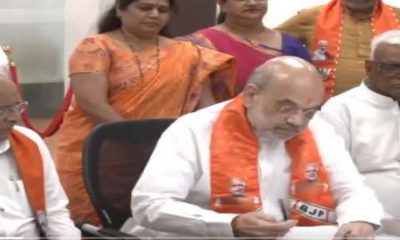
 2024 Lok Sabha Elections15 hours ago
2024 Lok Sabha Elections15 hours agoLok Sabha elections 2024: Amit Shah files nomination from Gandhinagar
-
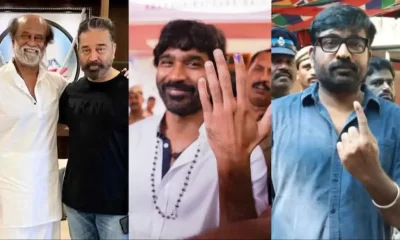
 2024 Lok Sabha Elections17 hours ago
2024 Lok Sabha Elections17 hours agoKamal Haasan, Rajinikanth, Vijay Sethupathi, Dhanush vote in Chennai
-

 Entertainment15 hours ago
Entertainment15 hours agoYami Gautam starrer Article 370 releases on Netflix today
-
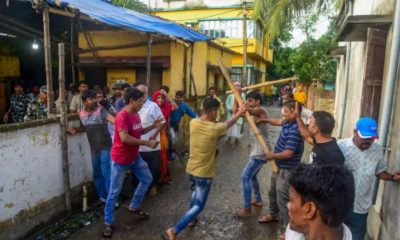
 2024 Lok Sabha Elections17 hours ago
2024 Lok Sabha Elections17 hours agoLok Sabha elections 2024: TMC, BJP workers clash in West Bengal’s Cooh Behar ahead of voting
-
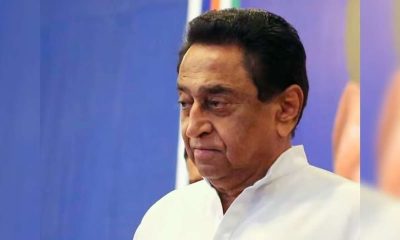
 2024 Lok Sabha Elections11 hours ago
2024 Lok Sabha Elections11 hours agoDeserted by key supporters, the Kamal Nath story looks set to wind to an end in Chhindwara
-

 2024 Lok Sabha Elections18 hours ago
2024 Lok Sabha Elections18 hours agoLok Sabha elections 2024: Google Doodle marks the start of polls with index finger voting symbol



